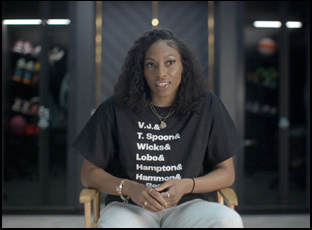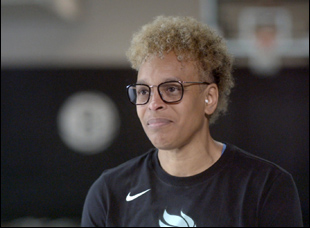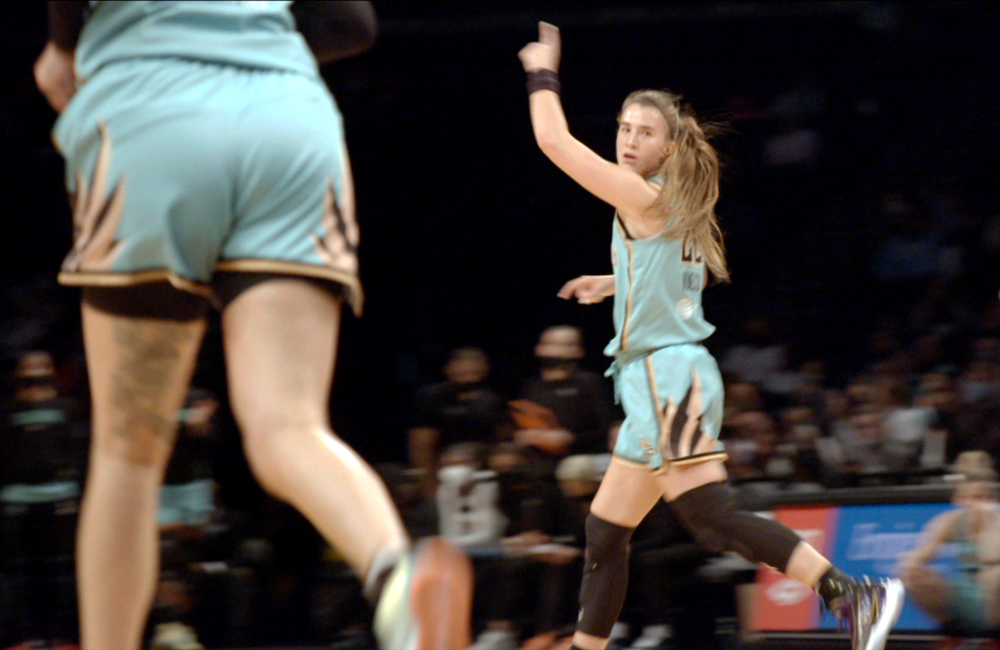It isn’t unusual for Alison Klayman to be right in the middle of the action, but still there may have been some surprise to see the filmmaker behind “Ai Weiwei: Never Sorry” and the Steve Bannon expose “The Brink” standing on the sidelines of a WNBA game.
“It was so much fun and those games are so much louder than you think,” Klayman says, smiling from ear to ear as she talks about spending the 2021 season with the New York Liberty. “I worry about my hearing because I had a ComTek [earpiece] on in one ear and the radio to the crew in the other ear, and I feel like I would just come home hoarse every night from screaming over the music and the crowd. But I really love basketball, I love these women, and now I sort of have a taste for having good seats at the games. I stand at the baseline [and think] ‘That’s where I’m supposed to be, right?’”
Not only has Klayman earned them by now, but if it in any way it sounds like she’s taking a spot from someone else, she has given audiences the ultimate courtside seat in “Unfinished Business,” an enormously entertaining and rigorous history of the American women’s professional basketball league upon its 25th anniversary, honing in on her hometown team. While the Liberty have never hoisted up a championship trophy, the squad with early pioneers such as Rebecca Lobo and Teresa Weatherspoon and now marquee attractions such as Sabrina Ionescu and DiDi Richards has both the legacy and ongoing relevance to provide a window into the evolution of the game and the continuing struggle to be afforded the same respect as their male counterparts.
A year before the unjust detention of Britney Griner in Russia would bring attention to the punishing reality that WNBA players have to supplement their income with playing full seasons abroad, Klayman chronicles the demands made of players for whom it’s expected that continuing to play hoops past college is compensation enough while bench players in the NBA can make more than entire WNBA franchises. However, any setbacks players have faced off the court have made it all the more impressive how far the league has come when the game itself has only improved with some of the greatest athletes in the world drawn to the WNBA with all the credibility it has built up over two-plus decades and a social media-savvy generation of players have started to make up for the marketing that wasn’t there after the league’s initial launch, generating as much excitement online as they do with their play.
Following the players’ lead, “Unfinished Business” finds that taking the game seriously and having fun with it aren’t mutually exclusive and with the same elite equilibrium, Klayman comes through with a real sense of celebration when not getting caught up with the individual win-loss column for the Liberty, but the long-term progress for gender equality that everyone in the WNBA is really competing for and making more of a reality with each season played. After the film wowed crowds with its premiere at the Tribeca Film Festival last summer, it is returning to New York with an exclusive theatrical run at BAM Rose Cinemas while being made available to watch everywhere else with a national broadcast on ESPN 2 this weekend and a debut on Prime Video thereafter and recently the director spoke about how she balanced out a story with so many micro and macro implications, working within the confines of a professional basketball season and capturing all that she loves about the sport.

Yeah, in the same way I had really wanted to do a music doc, I also really wanted to do a sports doc and when I say sports, I always meant women’s basketball. The opportunity started to emerge through Clara Wu Tsai, [who said] she’d be willing to help get access to the Liberty’s first season and I couldn’t have been more exuberant in describing my enthusiasm for the idea. I always saw it as this dual timeline story because how I look at the WNBA is seeing it for what it is in the present and also layering on top of it the excitement, the joy, the energy, the possibility of the early years when it first started. I wanted people to see it through my eyes in that way and I also wanted to explore all the ups and downs, and the challenges that the league faced from the beginning to now and how it wasn’t [always], “Oh, this is just going to be great and it’s only going to be greater from here” [while] at the same time, be a film that’s rooted in the present and looking to the future, which is a really tall order.
I know, and you’re making this sound easy and it comes across that way, but you seem to have made it even harder on yourself by not only to tell the history of the league in the present tense, but to do so through a single team. Was that always in mind?
That was the vision from the beginning, whether or not everybody always believed in it, I believed in it and somehow we got through the other side. [laughs] My editor Brian [Goetz], who I’ve worked with on my last several films since “The Brink,” was like, “Is this a multi-part series?” And I just was adamant that it was going to work the way it worked, but it was a lot of work to go back and forth in that way [between the story of the team and the broader WNBA history, as well as the past and present] and figure out how to lead off [a certain section of the film] and when you go between.
[Our] production was pretty focused on the season, so we weren’t following anyone overseas, but we knew this is one of the biggest issues that we had to depict. And I got into everything in in terms of the research and interviews and the collective bargaining agreement and the players union from early days, [as well as] the challenges for [media] coverage — the fact that the league was coming up at the same time that newsrooms are cutting their staff, where it’s really hard to get coverage in the summer for a non-classic sport season. The hardest thing in the edit was figuring out what our North Star was. This is a film rooted in the present, looking to the future, so that does necessitate really boiling down a lot of the issues to what makes the most sense to show in a film to give the audience a satisfying arc and explanation of these 25 years, but there’s so much more you could get into.And then everybody has such great stories and I want to live in a world where everybody gets a movie or a series, but because it’s a team sport, I felt like having the team the main subject does make a lot of sense and the Liberty stands in so well for the story of the league and the league [itself] stands in so well for this larger issue of women’s pro sports, especially team sports in America and how progress happens in America more broadly.
You do get to follow Didi Richards and some of the other players home, and of course, Teresa Weatherspoon gets her due as one of the Liberty’s most legendary players. Did certain players start to stand out as storylines?
[Filming] was really intense because we started in the preseason and the WNBA is a really competitive place where everyone who trains with the team does not make it. The roster only gets locked a couple weeks in, and players were coming back from overseas [and there were] COVID regulations, so there really was a time whereI was like, “Oh no, I’m falling in love with someone. Can anyone tell me if she’s going to get cut?” And there were some players that rose up because they were clearly leaders on the team and some because they were just so much fun. We knew in terms of interviewing the Liberty Legends as we call them, like Swin Cash and T-Spoon are going to be really great, and [Rebecca] Lobo is a professional broadcaster. But everybody exceeded my expectations. And I didn’t know as much about Crystal Robinson, for instance, [who was] one of my favorite interviews, or Kim Hampton, but everyone responded really well and the interviews where they were really made themselves emotionally available to these questions that were really not just what happened to you, but how did it feel.
That comes with the territory with documentary that [when] compared to journalists who stay for an entire career in one field, access journalism can mean something different where you might be afraid to say what you’re going to say. Honestly, the reporters I saw around [Steve] Bannon [in filming “The Brink”], for instance, there were sometimes where people play it safe because they need access for the future. And with films,you have this long relationship and they don’t see the film until the end,, so they’re not evaluating your output as you go and deciding if they want to stay with you, so you’re navigating the access on the ground in an interpersonal way and then you have to make something at the end and it has to be something that you can stand by.
I’ve never made a film where the subject has editorial control, but it has to be something that you’re ready to stand behind, and you will want to make it something that feels like the people in it can see the truth of it, even if it’s not what they would have made. On a project like this, it was so clearly going to be celebratory but really revealing the challenges without glossing over them and there’s always sensitivities that you might not share, so you have to be careful and access with the sports league, obviously, is the incredible work that my fellow producers really handled and it was hard sometimes — even though we had access, that doesn’t mean that they can accommodate every request you have, so you also have to understand what’s realistic and what’s going to bother professional athletes before a game. Their schedule was the biggest obstacle to making this film, and to get the sit-down interviews with the players that we did, it was basically at the end of the season, and the second they’re out, they all scatter immediately, so figuring out how to schedule that and the fact that we were able to do it on the floor at Barclays was a huge lift, so much huger than you’d think. No matter what, it’s not laid out for you as a filmmaker because [all the players] are actually living their lives. But when people saw it at Tribeca [during the premiere], we got reactions like, “I’m so glad, you told this story and I’m so sorry for all the times I said no.” And that’s the kind of thing you just love to hear because you don’t want to be a pain if you can help it, but also you want people to feel like it was all worth it. And in this case, they did.
“Unfinished Business” opens theatrically on May 12th in New York at the BAM Rose Cinemas and will make its national broadcast premiere on ESPN 2 on May 14th. It will also be available to rent or buy on Prime Video beginning on May 13th and available to stream on May 15th.




